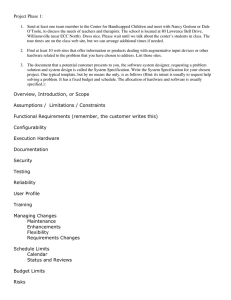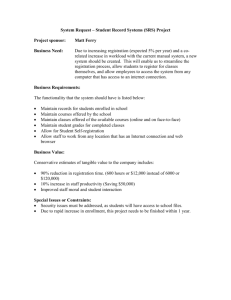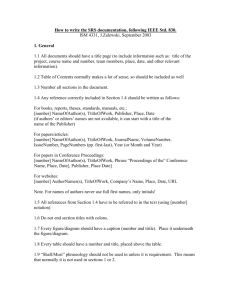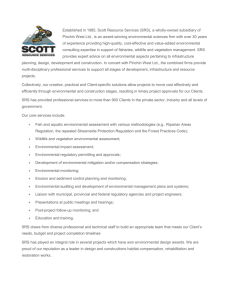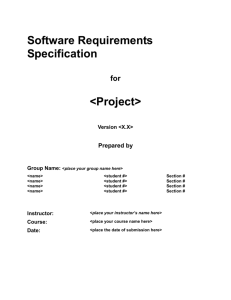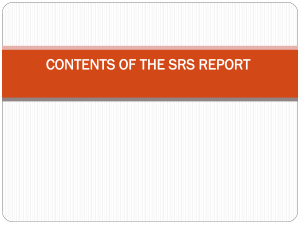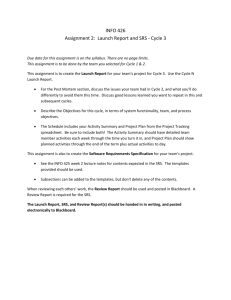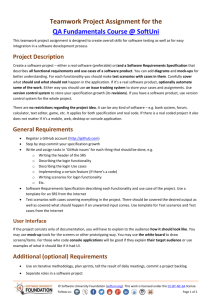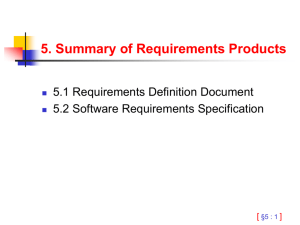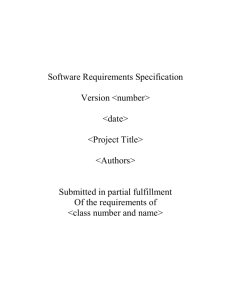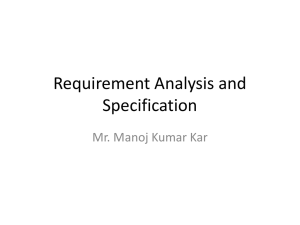CIDMU Web System Development, Standard Operating Procedure
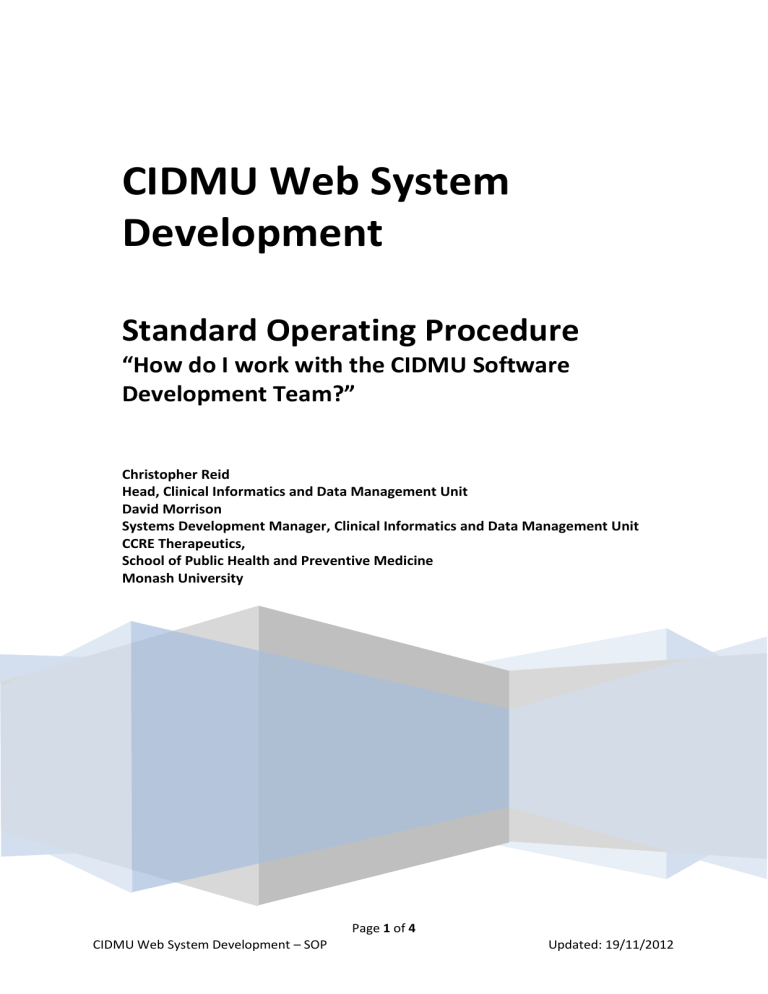
CIDMU Web System
Development
Standard Operating Procedure
“How do I work with the CIDMU Software
Development Team?”
Christopher Reid
Head, Clinical Informatics and Data Management Unit
David Morrison
Systems Development Manager, Clinical Informatics and Data Management Unit
CCRE Therapeutics,
School of Public Health and Preventive Medicine
Monash University
Page 1 of 4
CIDMU Web System Development – SOP Updated: 19/11/2012
Introduction:
The Clinical Informatics and Data Management Unit (CIDMU) in the School of Public Health and
Preventive Medicine is a Monash University platform for the development of web based and desk-top applications for the collection and management of clinical information for the conduct of randomised trials and clinical registries.
The current suite of services offered through the Unit includes; a) Web-based data capture and reporting systems b) Desk-top based data capture and reporting systems c) Web-based clinical trial randomisation services d) Clinical trial and registry development and management e) Clinical trial design f) Data migration services
The Unit consists of 30 highly trained software development, clinical research project and data management professionals.
CIDMU Systems Architecture - Overview
CIDMU currently complies with the Information Security standard ISO 27001. Systems developed with identifiable or derived clinical data are deployed into the Monash Red Zone for data security.
A typical system architecture may consists of:
Web front end (C# .NET) for users
Secure web front end (C# .NET) for administrators
Secure Microsoft SQL Server database
Secure File Repository
Secure File Transfer Protocol (SFTP) server
Secure Microsoft SQL Reporting Services
The architecture framework for the systems to be developed will be outlined in the Systems
Requirements Specification (SRS) and the decision may depend on the functionality required by the application, business needs and other factors. The architecture will be agreed to prior to commencement of programming work.
Page 2 of 4
CIDMU Web System Development – SOP Updated: 19/11/2012
The Project Development Plan
1. The Project Brief
The initial requirement for “getting started” is to work up a Project Brief (See Project Brief
Template). The Project Brief is used by the business unit to share information about the intended development and gather additional information as required. Following delivery of the Project Brief, the
CIDMU Systems Development Manager will communicate with the Study Project Manager for a meeting to review the Project Brief, discuss the CIDMU methodology and expectations, and introduce the Business Analyst, who will drive the completion of the SRS.
2. Systems Requirements Specification
The purpose of the Systems Requirements Specification (SRS) is to develop documentation regarding the functional requirements for the system to be developed. The gathering of the systems requirements will be led by the CIDMU Business Analyst and will involve interaction with key stakeholders, champion users and systems developers. Meetings will be arranged in order to fully document the requirements of the proposed system. The requirements will includes mock-ups of the interface, usability requirements and user acceptance tests.
Once the SRS has been developed, it requires verification by the Study Project Manager and the
CIDMU Systems Development Manager. It then requires sign off by the Principal Investigator for the proposed system, and the Head of CIDMU.
Following sign off of the SRS, a proposed budget, payment schedule and timeline will be prepared and sent for approval to the Principal Investigator. No development work can begin until all documentation and signatures have been received and a contract or Memorandum of Understanding
(MOU) is in place.
If development does not proceed, it is expected that costs incurred for the development of the
SRS be reimbursed to CIDMU.
3. Systems Development
CIDMU utilises an agile software development framework and will progress work in iterative cycles called “sprints”. Each “sprint” begins with a planning meeting to discuss which sections of work will proceed in priority order and to gain additional clarity as to the specifications. Development then begins on the agreed units of work for the 23 week “sprint”. Each “sprint” is followed by a review meeting. This allows the opportunity for feedback from the client and acceptance that the units of work are “done”.
The Study Project Manager is expected to contribute to each and every one of these meetings.
4. Change Requests
There is the opportunity for changes to be considered within the development process via a change request process. The impact of these changes on: a) the timeline for delivery, b) the project risks and c) the project budget must be agreed prior to the commencement of development for any change request. These requests are assumed to be minor. Major changes are covered in System
Improvements.
All change requests are to be collated through the Study Project Manager.
Page 3 of 4
CIDMU Web System Development – SOP Updated: 19/11/2012
5. Test System
Following the end of the last “sprint”, the application is typically placed into a test environment so that it can be reviewed prior to going into production. This system is a replica of what would be expected once the system moves to production. Time is given, typically two weeks, to “play” with the system and ensure that it meets the original System Requirements Specification. It is the Client ’s responsibility to ensure that they organise and allow adequate staff and time to test the system during this phase.
Finalising the testing phase, CIDMU will undertake the following as part of the development contract; any bug fixes identified during the test that are within scope i.e. – correction of functionality specified in the Systems Requirements Specification document that is either missing or not working.
No additional functionality or development work is completed during this phase.
6. Production System
Following the testing phase, the system will be moved to the production environment and considered “delivered”. Whilst systems are delivered with “no known errors”, CIDMU will make every effort to undertake correction of any unforseen errors that are still considered to be within the initial scope of works within the early stage of production (30 day period). System delivery will constitute
Project Completion.
7. System Improvements
Typically once a system is being used in production, with multiple users across multiple sites, the enhanced use of technology creates new opportunities. These new opportunities can take the form of additional new features, new reporting requirements or new functionality. They are all considered as System Improvements. Usually these improvements constitute significant (not minor) pieces of work.
All system improvements should be collated by the Study Project Manager. The CIDMU
System Development Manager can provide a quotation for system improvements. These will only be actioned once approved and budgeted.
8. Systems Maintenance
All web-based systems require maintenance above and beyond change requests and system improvements. Maintenance includes:
Server Maintenance (including security patches)
Domain and Certificate registration
User management
System backup and recovery
All systems will have a minimum maintenance requirement of 1 hour per week and will be costed at
$6,000 - $10,000 for each year the project is required to have a live functioning system available.
Studies continuing beyond their original expected timelines will continue to be billed while this requirement exists and amendments to contracts / MOUs will be sought.
9. Ongoing Support
Ongoing Support is determined as:
Any minor changes, bug fixes, user administration, training and performing data extraction as requested
Significant modifications are not covered under support and require a separate quote as per System Improvements
All support requests are required to be lodged into the Service Desk Online (SDO) system
Ongoing Support is charged at $150 per hour
Page 4 of 4
CIDMU Web System Development – SOP Updated: 19/11/2012
